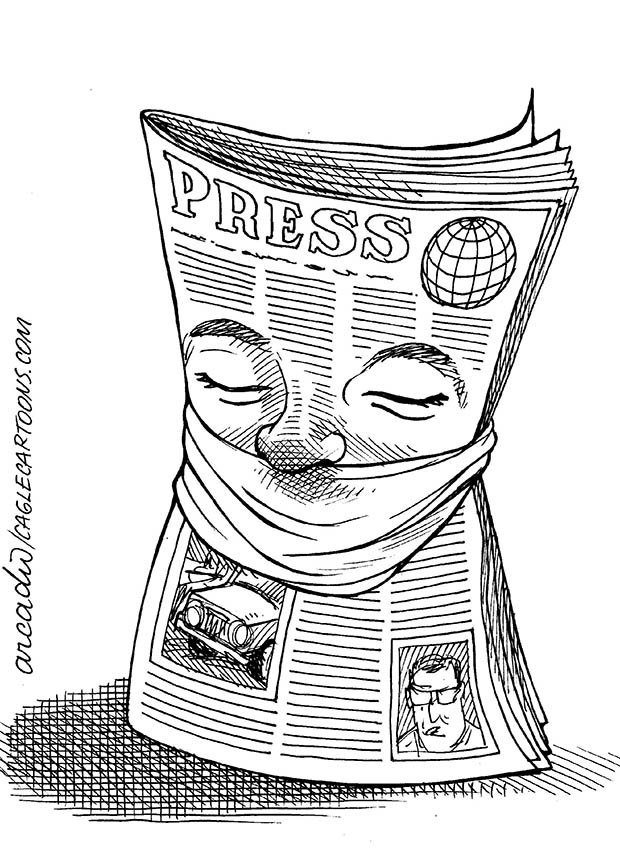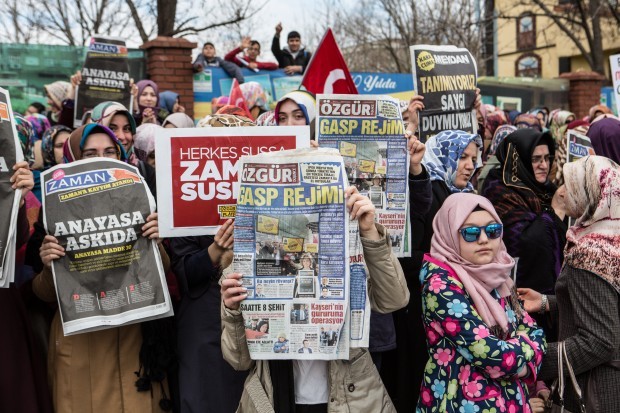31 May 2016 | Events, Middle East and North Africa

The New Arab news network invites you to a panel discussion to discuss the challenges faced by the media and journalists in the post-Arab Spring era. The Arab Spring of 2011 presented hope for a region free from dictatorial rule and media constraints, but since the people’s uprising, much the opposite has happened. The Arab world is still plagued by media censorship, and independent journalism and objective coverage can be a life-threatening exercise.
The Arab Spring of 2011 presented hope for a region free from dictatorial rule and media constraints, but since the people’s uprising, much the opposite has happened. The Arab world is still plagued by media censorship, and independent journalism and objective coverage can be a life-threatening exercise.This discussion will explore the current state of the media in the region and the future of press freedom in the wider Arab world.
This discussion will explore the current state of the media in the region and the future of press freedom in the wider Arab world.
Hosted and Chaired by SNP MP Tommy Sheppard.
Speakers Include:
– Faitma El-Issawi, research fellow, LSE Middle East Centre
– Melody Patry, advocacy officer at Index on Censorship
– Abdu Elshayyal, CEO of The New Arab
When: Wednesday, 15 June 2016 from 5.30-7pm
Where: Conference Room 15, House of Commons, London, SW1A 0AA (view map)
Tickets: Free, but registration is required.
11 Mar 2016 | mobile, News, Turkey, Turkey Letters, Turkey Statements

A week and 2,611 signatures later, our work denouncing the Turkish authorities for the takeover of Zaman — a formerly independent publication once critical of President Recep Tayyip Erdogan’s regime — is far from over.
Leading UK newspaper editors and journalists including Tony Gallagher (The Sun) and Paul Dacre (Daily Mail) have already joined journalists Tim Stanley, Peter Oborne and James Ball — among others, including artist and author Molly Crabapple, historian and author Tom Holland and Greg Lukianoff, president and CEO of the Foundation for Individual Rights in Education (FIRE) — to condemn the seizure by signing Index on Censorship’s open letter. If you haven’t already, please join them.
The call to action reads: “Today Turkey seized one of the country’s leading newspapers. In so doing, Turkey has confirmed that it is no longer committed to a free press, which is the bedrock of any democratic society.”
In the days following the attack on Zaman with tear gas and water cannons, Turkey’s prime minister Ahmet Davutoğlu was greeted in Brussels with offers of billions of dollars in aid, visa-free travel for Turks in Europe and renewed prospects for joining the European Union. In return, Turkey says it will help Europe manage its refugee crisis. As talks continue, so must our efforts to ensure the most basic standards of democracy and a free press are upheld in Turkey.
As Index on Censorship’s Mapping Media Freedom project shows, Zaman is just the latest in a long line of media violations in Turkey. In the wake of the takeover, the crackdown looks set to continue.
We must ensure Turkish authorities are held to account for their actions. Start now, with the small act of signing the petition calling for the court to reverse its decision and show solidarity and support afflicted journalists.
28 Jan 2016 | Magazine, mobile, Volume 44.04 Winter 2015 Extras

Kunle Olulode, Max Wind-Cowie, Jodie Ginsberg and Shazia Mirza at last night’s debate (Photo: Sean Gallagher / Index on Censorship)
“When I went to the Loaded offices with hairy legs they told me to get out and that I could never be on the cover of the magazine because apparently I’d made an effort with my nails but not my legs,” said comedian Shazia Mirza, at the launch of the latest taboo-themed issue of Index on Censorship magazine.
Do taboos still exist in society today? Are taboo subjects still brushed under the carpet instead of being faced head on? Is comedy a perfect platform to tackle these issues? These were just some of the questions discussed during the evening of discussion and debate.
Chaired by Index on Censorship chief executive Jodie Ginsberg, panellists included Kunle Olulode, director of campaigning charity Voice4Change England, writer and political consultant Max Wind-Cowie, plus comedians Grainne Maguire and Mirza.
The night kicked off with a fast and furious comedy performance from Michele Moran, filled with tales of taboos and secrets.
Wind-Cowie told the audience at the Royal Vauxhall Tavern of his surprise when people reacted to Rupert Murdoch and Jerry Hall’s marriage with jokes and disgust at the thought of older people having sex.

Index on Censorship’s CEO Jodie Ginsberg with comedians Shazia Mirza and Grainne Maguire (Photo: Sean Gallagher / Index on Censorship)
He said: “I think it’s a bit sad because I hope to be an older person one day, and I hope that the older person that I will become will be allowed to have sex with someone. And I hope that when we are having sex they won’t be looking at me and thinking ‘my God you’ve got disgusting’. So I think it’s wrong that it’s something we all laugh at so much.”
Maguire joked to the audience that mental illness was a requirement as a comedian but agreed there was still a lot of stigma around mental health.
“In certain careers you’re supposed to be macho and mental illness is still seen as a sign of weakness. I just think that’s really depressing and sad. I think you should be allowed to be vulnerable, but I don’t think were there yet,” she said.
The panel moved to discussing whether suicide and grief were taboo in different societies. Mirza said: “Some Muslims believe that suicide is wonderful. You blow yourself up and go into the afterlife where there are virgins and wine. So it may be terrible in the West but to Muslims suicide is great, and we talk about it all the time.”
Olulode told the audience how for him the last taboo was racism. “In terms of race, there’s a lot of discussion about the discrimination and the attitudes towards black people, but we rarely discuss the construction of what it is to be white.”
He said: “There’s an old left-wing saying: ‘Nothing is alien to me.’ And that idea of investigating every aspect of humanity seems to have become lost along the way. The contestation of ideas in society today is more about protecting people from being exposed to difficult subjects or ideas than actually tackling them head on.”
The evening was rounded off with a lively taboo disco set from DJ Bamboo.
2 Dec 2015 | Magazine, mobile, Volume 44.04 Winter 2015
[vc_row][vc_column][vc_custom_heading text=”What can’t people talk about? The latest magazine looks at taboos around the world”][vc_row_inner][vc_column_inner width=”1/2″][vc_column_text]
What’s taboo today? It might depend where you live, your culture, your religion, or who you’re talking to. The latest issue of Index on Censorship magazine explores worldwide taboos in all their guises, and why they matter. Comedians Shazia Mirza and David Baddiel look at tackling tricky subjects for laughs; Alastair Campbell explains why we can’t be silent on mental health; and Saudi Arabia’s first female feature-film director Haifaa Al Mansour speaks out on breaking boundaries with conservative audiences.
[/vc_column_text][/vc_column_inner][vc_column_inner width=”1/2″][vc_empty_space height=”60px”][vc_single_image image=”71995″ img_size=”full”][/vc_column_inner][/vc_row_inner][vc_column_text]
Plus a crackdown on porn and showing your cleavage in China; growing up in Germany with the ghosts of WW2; what you can and can’t say in Israel and Palestine; and the argument for not editing racism out of old films. As the anniversary of Charlie Hebdo murders approaches, we also have a special section of cartoonists from around the world who have drawn taboos from their homelands – from nudity, atheism and death to domestic violence and necrophilia.
Also in this issue, Mark Frary explores the secret algorithms controlling the news we see, Natasha Joseph interviews the Swaziland editor who took on the king and ended up in prison, and Duncan Tucker speaks to radio journalists who lost their jobs after investigating presidential property deals in Mexico.
And in our culture section, Chilean author Ariel Dorfman looks at the power of music as resistance in an exclusive short story, which is finally seeing the light after 50 years in the pipeline. We have fiction from young writers in Burma tackling changing rules in times of transition, and there’s newly translated poetry written from behind bars in Egypt, amid the continuing crackdown on peaceful protest.
Each magazine sale helps Index on Censorship fight for free expression worldwide. Order your copy here, or take out a digital subscription via Exact Editions (just £18 for the year).
[/vc_column_text][/vc_column][/vc_row][vc_row][vc_column][vc_custom_heading text=”SPECIAL REPORT: WHAT’S THE TABOO? ” css=”.vc_custom_1483453507335{margin-right: 0px !important;margin-left: 0px !important;border-bottom-width: 1px !important;padding-top: 15px !important;padding-bottom: 15px !important;border-bottom-color: #455560 !important;border-bottom-style: solid !important;}”][vc_column_text]
Why breaking down social barriers matters
Stand up to taboos – Shazia Mirza and David Baddiel on how comedy tackles the no-go subjects
The reel world – Nikki Baughan interviews female film directors Susanne Bier and Haifaa Al Mansour, from Denmark and Saudi Arabia
Not just hot air – Kaya Genç goes inside Turkey’s right-wing satire magazine Püff
Slam session – Péter Molnár speaks to fellow Hungarian slam poets about what they can and can’t say
Whereof we cannot speak – Regula Venske on growing up in Germany after WWII
China’s XXX factor – Jemimah Steinfeld investigates a crackdown on porn and cleavage
Pregnant, in danger and scared to speak – Nina Lakhani and Goretti Horgan on abortion laws and social stigma in El Salvador and Ireland
Airbrushing racism – Kunle Olulode explores the problems of erasing racist words from books and films
Why are we whispering? – Alastair Campbell on why discussing mental illness still makes some people uncomfortable
Shouting about sex (workers) – Ian Dunt looks at the debate where everyone wants to silence each other
The history man – Professor Mohammed Dajani Daoudi explains how he has no regrets, despite causing outrage after taking Palestinian students to Auschwitz
Provoking Putin – Oleg Kashin on how new laws are silencing Russians
Quiet zone: a global cartoon special – Featuring taboo-busting illustrations from Bonil, Dave Brown, Osama Eid Hajjaj, Fiestoforo, Ben Jennings, Khalil Rhaman, Martin Rowson, Brian John Spencer, Padrag Srbljanin, Toad and Vilma Vargas
[/vc_column_text][/vc_column][/vc_row][vc_row][vc_column][vc_custom_heading text=”IN FOCUS” css=”.vc_custom_1481731813613{margin-right: 0px !important;margin-left: 0px !important;border-bottom-width: 1px !important;padding-top: 15px !important;padding-bottom: 15px !important;border-bottom-color: #455560 !important;border-bottom-style: solid !important;}”][vc_column_text]
Reining in power – Natasha Joseph talks to the Swaziland editor who took on the king
Whose world are you watching? – Mark Frary explores the secret algorithms controlling the news we see
Bloggers behind bars – Ismail Einashe interviews Ethiopia’s Zone 9 bloggers
Mexican airwaves – Duncan Tucker speaks to radio journalists who were shut down after investigating presidential property deals
Head to head – Bassey Etim and Tom Slater debate whether website moderators are the new censors
Off the map – Irene Caselli on how some of the poorest people in Buenos Aires fought back against Argentina’s mainstream media
[/vc_column_text][/vc_column][/vc_row][vc_row][vc_column][vc_custom_heading text=”CULTURE” css=”.vc_custom_1481731777861{margin-right: 0px !important;margin-left: 0px !important;border-bottom-width: 1px !important;padding-top: 15px !important;padding-bottom: 15px !important;border-bottom-color: #455560 !important;border-bottom-style: solid !important;}”][vc_column_text]
The rocky road to transition – Ellen Wiles introduces new fiction by young Burmese writers Myay Hmone Lwin and Pandora
Sounds of solidarity – Chilean author Ariel Dorfman presents his short story on the power of music as resistance
Poetry from a prisoner – Omar Hazek shares his verses written in an Egyptian jail and translated by Elisabeth Jaquette
[/vc_column_text][/vc_column][/vc_row][vc_row][vc_column][vc_custom_heading text=”COLUMNS” css=”.vc_custom_1481732124093{margin-right: 0px !important;margin-left: 0px !important;border-bottom-width: 1px !important;padding-top: 15px !important;padding-bottom: 15px !important;border-bottom-color: #455560 !important;border-bottom-style: solid !important;}”][vc_column_text]
Global view – Index on Censorship’s CEO, Jodie Ginsberg, on the pull between extremism legislation, free speech and terrorism
Index around the world – Josie Timms presents Index’s latest work and events
[/vc_column_text][/vc_column][/vc_row][vc_row][vc_column][vc_custom_heading text=”END NOTE” css=”.vc_custom_1481880278935{margin-right: 0px !important;margin-left: 0px !important;border-bottom-width: 1px !important;padding-top: 15px !important;padding-bottom: 15px !important;border-bottom-color: #455560 !important;border-bottom-style: solid !important;}”][vc_column_text]
[/vc_column_text][/vc_column][/vc_row][vc_row][vc_column][vc_custom_heading text=”SUBSCRIBE” css=”.vc_custom_1481736449684{margin-right: 0px !important;margin-left: 0px !important;border-bottom-width: 1px !important;padding-bottom: 15px !important;border-bottom-color: #455560 !important;border-bottom-style: solid !important;}”][vc_column_text]Index on Censorship magazine was started in 1972 and remains the only global magazine dedicated to free expression. Past contributors include Samuel Beckett, Gabriel García Marquéz, Nadine Gordimer, Arthur Miller, Salman Rushdie, Margaret Atwood, and many more.[/vc_column_text][vc_row_inner][vc_column_inner width=”1/2″][vc_single_image image=”76572″ img_size=”full”][/vc_column_inner][vc_column_inner width=”1/2″][vc_column_text]In print or online. Order a print edition here or take out a digital subscription via Exact Editions.
Copies are also available at the BFI, the Serpentine Gallery, MagCulture, (London), News from Nowhere (Liverpool), Home (Manchester), Calton Books (Glasgow) and on Amazon. Each magazine sale helps Index on Censorship continue its fight for free expression worldwide.
 SUBSCRIBE NOW[/vc_column_text][/vc_column_inner][/vc_row_inner][/vc_column][/vc_row]
SUBSCRIBE NOW[/vc_column_text][/vc_column_inner][/vc_row_inner][/vc_column][/vc_row]




